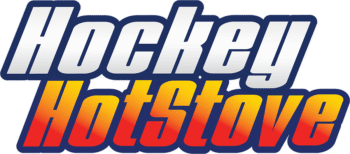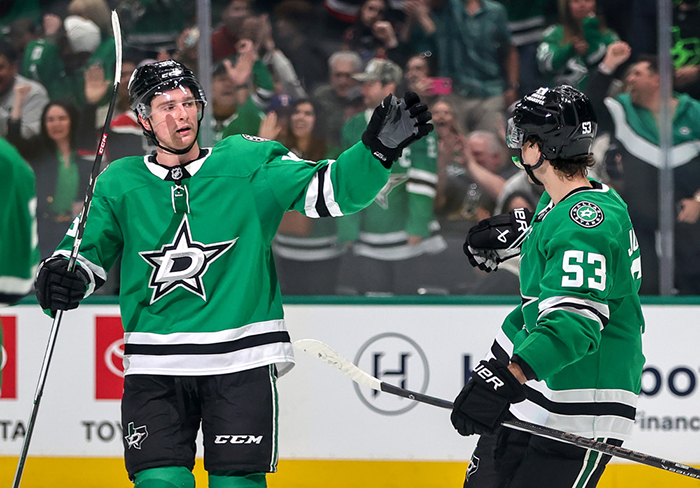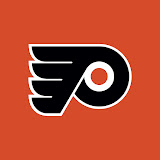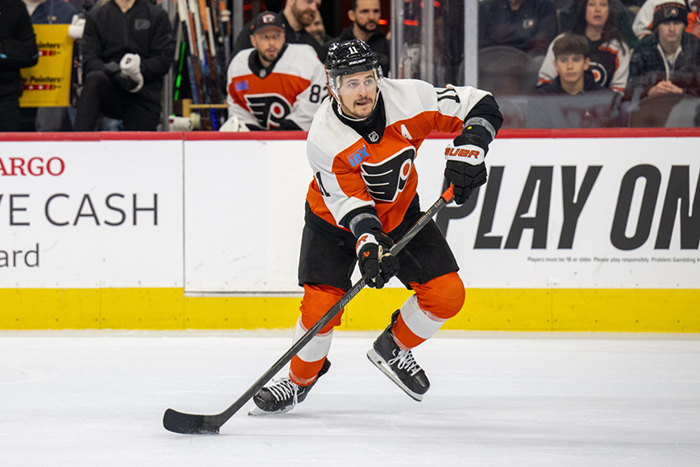I played two-plus seasons with Rick Tocchet as my Philadelphia Flyers’ teammate. To this day, I count “Tocc” among my buddies. I have no doubt we’ll always remain friends. So, no, I’m not entirely impartial here. I am thrilled that Rick is now the Flyers’ head coach. No apologies here. Tocchet is a leader and a winner.
Also, in the interest of full disclosure, Flyers president of hockey operations Keith Jones is another close friend and former teammate of mine.
So is Luke Richardson (rumored to potentially become part of Tocc’s coaching staff). Brad Shaw has elected not to stay on. It was Shawsy’s decision, not an organizational one. That may move Luke to the front of the line. Likewise, Mark Recchi (whose name has come as a possible candidate to coach the Flyers forwards and power play) is yet another good friend and teammate. We all played together on the 1999-2000 Flyers team.
I value each and every one of those guys greatly. So, I’m probably a bit biased. But I think it’d be an awesome staff if assembled that way.
Now, I don’t know exactly how Tocc, Jonesy and general manager Danny Briere plan to fill out the coaching staff. I will say this, however. My son no longer plays hockey (he’s focused on football) but, if he did, I’d be thrilled to have someone just like Rick coach him.
A natural leader
Tocc as a coach is very similar to how he was as a teammate. Everyone respects the hell of him. He holds others accountable — there’s no fluff and no B.S. with him — but he is no blowhard or bully. He’s not one to embarrass a player in front of the team. If he has to pull someone aside or call him into office, he’ll speak his piece. He’ll push guys in a constructive way. He’s blunt but not abusive.
Tocchet doesn’t need to do that. Everyone knows he’s in charge. Likewise, everyone knows of Rick’s legendary toughness as one of the best pure power forwards of the late ’80s to late ’90s. The best players don’t always make for the best coaches (see Wayne Gretzky) but Tocc had to work his tail off for everything he ever earned as a player. He can still see the player’s point of view. He understands how hard this game really is. He also has no time for excuses.
One of these days, I need to interview Jeff Chychrun to get his views on Rick. I suspect they match my own. Chych and I never played together, but I know him through hockey circles and the Flyers Alumni. He’s a grade A-plus human being. Chych has the perspective of someone who was an Flyers teammate of Rick’s. Later, in Arizona, Tocc coached Jeff’s son, Jake Chychrun. I know Jake learned some useful things about preparation and focus from Tocc. You can’t help but do so.
Tocc reminds me in some ways of Craig Berube. Chief is yet another one of my old teammates from the 1999-2000 Flyers, and one of my closest friends in or out of the game. With both Tocc and Chief, I think people just assume they coach the same way they played on the ice: on the edge, hard-nosed 24/7. That’s not how either of them actually operate.

Tocchet understands team chemistry
Rick Tocchet played on some outstanding hockey teams: The “Keenan’s Kids” Flyers of the mid-to-late 1980s and the Mario Lemieux heyday of the Pittsburgh Penguins most above all. He played in LA with Gretzky, Jari Kurri, and Ron Blake. Tocc also played in Boston with Ray Bourque, Adam Oates and Cam Neely.
Bottom line: Through winning experience, Tocchet knows what winners are made from.
When Rick came to the Flyers in 2000, he brought that winner’s mentality to our club. So did the group of guys I mentioned at the time. I need to add Johnny LeClair and Eric Desjardins to that list, too.
I want to look back and talk a bit about our team. It was my favorite year of my career. We fell one win shy of the Cup Final, which sucked. But my memories of the group we had are very important to me.
A leader is someone you hate to disappoint
Man, did we ever have a cast of off-ice beauties in that 1999-2000 group! We had guys in the locker room that were intense and others that kept the room light. I would put myself in the latter category. I hated to lose as much as anyone but, on day-to-day basis, I was pretty easy-going. I loved to joke around and laugh, and felt that I contributed to keeping the team loose.
We worked and played hard that year but we also laughed hard. We had a whole lot of talent on that team but we also had a group that I was proud to call my friends. Just to name a few, I absolutely loved being teammates with Berube and Tocchet, Jones and Richardson, LeClair and Recchi, Keith Primeau and Eric Desjardins.
Of that group, only Rico had been a longstanding member of the Flyers teams that dated back to the start of my career in Philadelphia. The other guys, all vets, came aboard a little later on. (Note: Recchs was a teammate when I was rookie but traded to Montreal early in the season in a deal for LeClair and Desjardins, and then came back to Philly several years later).
Change the people, and you change the chemistry. That group of guys who came aboard after our 1996-97 team that had reached the Stanley Cup Final, which also included veteran defenseman Luke Richardson, brought along a whole lot of on-ice experience and locker room know-how in terms of when to be serious and when to joke around. By this point, I was getting to be an NHL veteran myself.
To give an example of this, here’s a story: I would say, for the last 40 games of the year and playoffs we would tape something to Berube’s stick literally every single day. It might be a dustpan or a pail or a box of Kleenex or an entire roll of stick tape. It was to let Chief know that he’d be just about as well off trying to handle the puck with any of these objects as he would with the blade of his stick. He’d roll his eyes in mock disgust, then chuckle and take it all in stride and have a great time with it.
Chief used to have fun walking by rookie callups or reporters, giving them a joking version of the stare-and-scowl he often wore on the ice,and then the corners of his mouth would break into friendly vampire grin. That was his way of saying hello. Under the tough exterior, Craig is very caring with a heart of gold.
Jonesy was great with the locker room banter and on-ice chirps. He had a quip and a comeback for every situation. He could take teasing with a hearty laugh and then could give it back double. Loved to instigate and prod, but would be the first guy with a word of encouragement when you needed it.
Recchs was a top point producer his entire career, who had won a Cup with Pittsburgh early in his career, and would later win several more. He loved being a Flyer, and was probably a more well-rounded player his second stint after coming back from Montreal than he had been the first time. Mark was a star on the ice but just a regular guy off the ice and a great teammate; same with LeClair..
Quiet leaders matter, too
Primeau was more on the serious end of the stick; a little less unflappable than the stoic Rod Brind’Amour, less go-with-the-flow than John LeClair. I don’t meant that in a bad way whatsoever. I simply mean that Prims was all business, on the ice and in the locker room. He wasn’t going to joke around much and wasn’t the right guy to needle. He needed his focus and concentration to be in “on” mode most of the time to be successful. As a teammate, you needed to respect that. Once you got to know Keith and he got to know you — this is the type of mutual understanding I referred to earlier — he was actually a very good leader and a nice guy.
My longtime defense partner, Eric Desjardins, was another player in the locker room that did not say much but was as important as anybody you would find in that room. He brought a Stanley cup with him, impeccable work habits, an almost superhuman ability to block out pain (including playing through an 80 percent ACL tear for half a season) and a winner’s attitude wherein he never made a single excuse. Win or lose, he was one who stayed on an even keel but you knew that losing stung him deeply.
Both before and after 1999-2000, we had winning team. That year’s team wasn’t even our most talented of my two-stint Flyers career. We’d lost Eric Lindros for much of the season. Rod Brind’Amour’s iron man streak ended at the start of the season and then he was traded mid-season for Prims.
Nevertheless, even with depletions at key times and with the adversity of Roger Neilson being diagnosed with cancer and assistant coach Craig Ramsay taking over as interim head coach near the end, I was never on a team that was more perfectly assembled and better equipped to win a Stanley Cup than the one we had that year.
Yes, I include the 1996-97 team that reached the Stanley Cup Final and the 2003-04 team (the final 3/4 year of my first Flyers stint) in that statement. Those were special teams for different reasons, but the best chemistry was forged among that 1999-2000 group, in my opinion. In the 2000 Stanley Cup playoffs, we had a three games to one lead on the New Jersey Devils in the Eastern Conference Finals before losing three straight. That was the most painful result of my NHL career, made even worse by the fact the Devils won the Stanley Cup. It stung me worse than the Cup Final sweep by Detroit three years earlier.
To this day, it still hurts.That was a perfectly put together group by Bob Clarke. We were ultra-competitive but loose. We had some youth, such as rookie goalie Brian Boucher and rookie defenseman Andy Delmore, and we had older veteran guys who really mentored younger players and help them along. Being a great team is not just about being able to move the puck and score goals. It’s also about loving your teammate off the ice like you would a family member. Any time you have a group that has the talent to compete, but also a family-like level of caring for one another, you are on to something special and unique. Clarkie knew how to build teams.
Like any big family, you are going to find a cast of characters with different personalities. Like any family, sometimes there will be disagreements that get heated. A strong family unit pulls through it, and gets that much stronger.
Clarkie understood the importance of that dynamic. He also understood that a team also need some guys who don’t rock the boat and pretty much get along well with everybody. These middle-ground guys are the bridge between the most intense teammates and the ultra laid-back ones, and help keep the team from being too divided into cliques.
I think was one of those middle-ground guys. John LeClair and Shjon Podein would be two others; Johnny more on the quiet side than Podes but with a dry sense of humor, and Podes certainly more on the outgoing end. Both were very easy for everyone to get along with. What’s more, I never met a human being who couldn’t get along with Mikael Renberg. He’s a genuinely good man who finds the good in every other person and makes the best of every situation.
A quick example of Johnny’s dry wit at its best: We had a game in the early 2000s where, for whatever reason, we just couldn’t get anything going. The guys were starting to get frustrated, slamming sticks and yelling at no one in particular. The body language was bad, and the moods were foul.
On the bench, Johnny hollered in a deadpan voice, “C’mon, boys! We just need to pick up on Pavel’s energy, and we’ll be fine.”
I looked down the bench. Young forward Pavel Brendl, who was anything but a high-energy sort of personalty, sat there inattentively with a slumped-over and lethargic posture, stick blade facing the wrong way and a sad-eyed facial expression that looked very much like the Droopy Dog cartoon character. I couldn’t help myself. I broke out laughing so hard that I nearly wet myself. Other guys spit out the contents of their water bottles from their laughter. It was contagious.
Just like that, the frustration was lifted. Bad body language gave way to a more positive vibe. Suddenly, we were all having some fun again. Hockey is best when you’re competing hard but also having fun.
You know who understands all of these dynamics, inside and out? Rick Tocchet, that’s who. It’s not about systems. It’s about the group.
Winners breed winners
Tocchet, of course, was a longtime Flyers player from the previous generation of successful club. He started out as one of the young guns during the Mike Keenan years. By the time he eventually got back to the Flyers for a second stint, he was an elder statesman who had seen and done it all in the league. Still tough as nails. Still scored clutch goals. Still a great guy off the ice. Still a total pro. Intense when he needed to be, pretty easy-going the rest of the time.
Chief, Tocc and Luke Richardson all knew how to keep guys accountable. Believe me, no one wanted any of those guys mad at them. If they were, though, it was for good reason. The rest of the time, they kept things loose. You also knew they all had your back, whether some guy had cheap-shotted you on the ice or if your car had broken down on the way to the rink. They’d take care of you.
Luke in particular would do absolutely anything for a teammate. No ask was too big or too small. Off the ice, he made sure that everyone felt like they belonged. It made no difference who you were, how long you’d be there or what your role was on the team. Didn’t matter if you were a guy he’d known since junior hockey or a just-arrived European player still learning the language and culture. Luke would help you to the absolute best of his ability, day or night, at the rink or on off-day.
In return, damn right, you never wanted to disappoint these guys. You’d see how hard they worked each and every day, how willingly they’d shed their own blood to protect you if that’s what it took, how they made sure you didn’t feel isolated or like a lesser part of the team off the ice. How they never threw you under the bus to a coach or to a reporter. The least you could do was to try your 100 percent best to follow in kind.




Amazing stuff! Will Chris be writing more of these? Maybe get more former players to write articles?
Great article Chris, I am a long time Flyers fan and I wanted to say thank you for giving us an inside perspective on Tocc and other players you played with during your career as a Flyer. I hope you continue to write for hockeyhotstove.com and share more with us.
Good article Chris, I am a Canucks fan (I know let’s not rub it in) and also I Tocchet fan, I was gutted when he left Vancouver but wish him and the Flyers nothing but the best going forward.